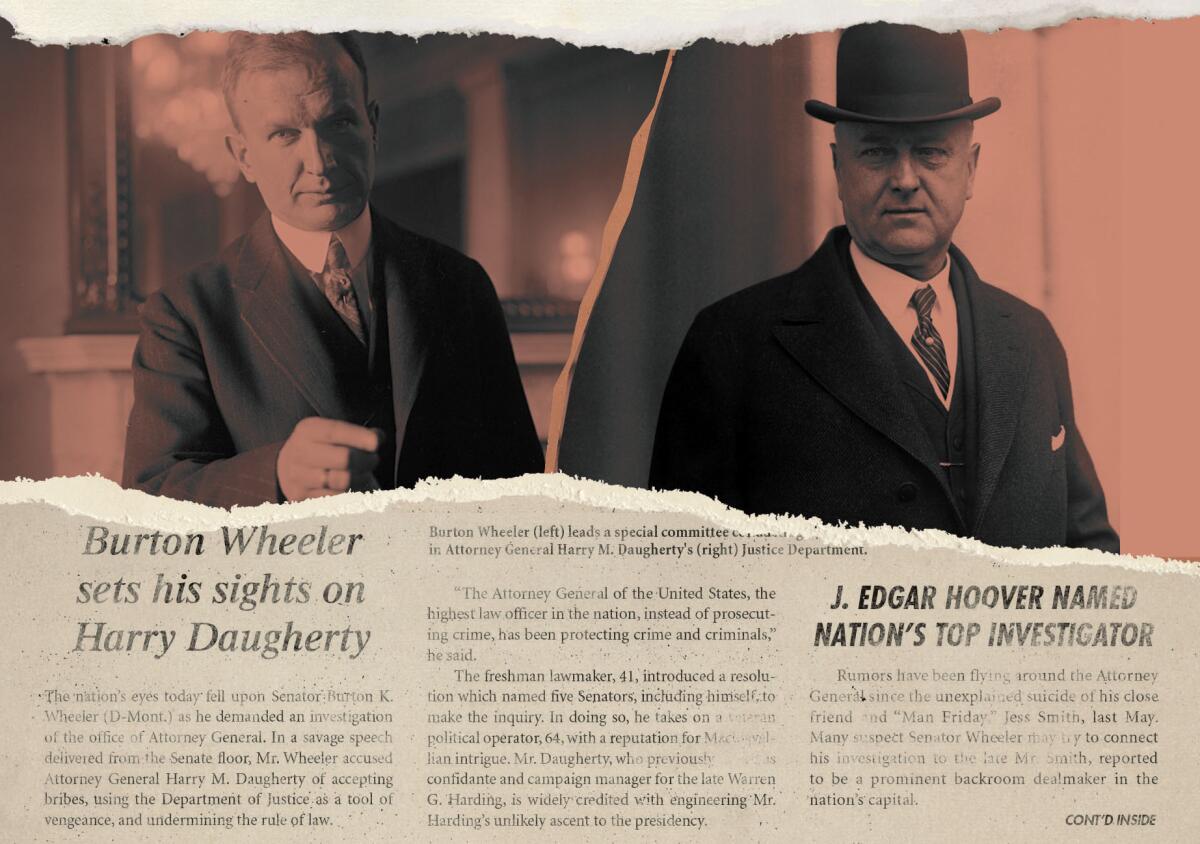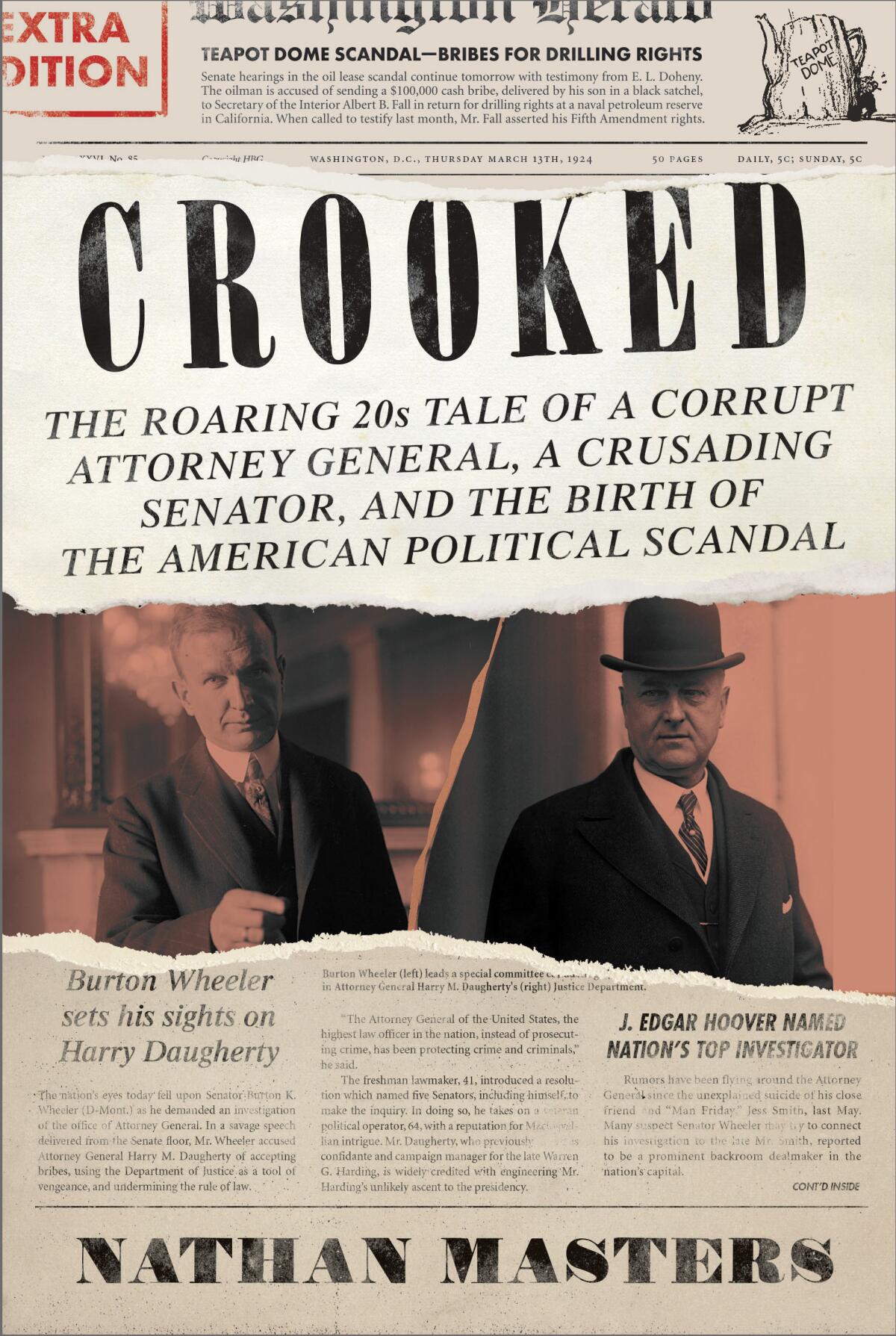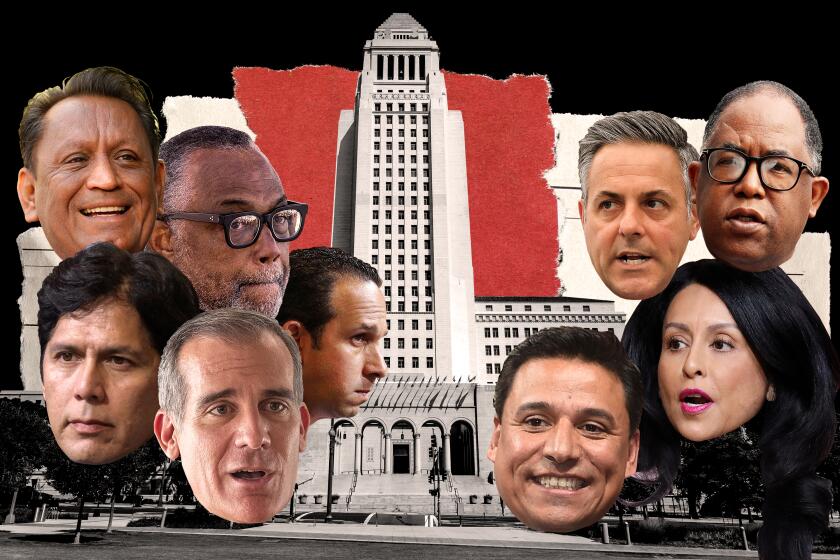How Trump’s misdeeds inspired a new history of the first mass-media congressional hearing

- Share via
On the Shelf
Crooked: The Roaring '20s Tale of a Corrupt Attorney General, a Crusading Senator, and the Birth of the American Political Scandal
By Nathan Masters
Hachette: 384 pages, $30
If you buy books linked on our site, The Times may earn a commission from Bookshop.org, whose fees support independent bookstores.
During the height of Prohibition, people knew they could get booze on the sly: in speakeasies, say, or as “medicine” prescribed by pharmacists. What they didn’t know was that the attorney general of the United States, the nation’s top law enforcer, was making that all possible with illicit liquor deals that lined his pockets. This was perhaps the most startling revelation of progressive firebrand Montana Sen. Burton Wheeler’s campaign against Harry Daugherty, waged in a small hearing room packed to overflowing.
If Warren G. Harding’s administration is remembered much today, it is for its corruption. Historian Nathan Masters was inspired by Wheeler’s determination to get at Daugherty — and the clever ways he leveraged his Senate platform to captivate the nation.
We have Wheeler to thank for every big-ticket, media-focused congressional hearing in the century since, good and bad: Joe McCarthy’s shameful House Un-American Activities Committee, the powerful Senate Watergate Committee in 1973-74 and the House Jan 6. Committee hearings in 2021-22.
Preferring substance over spectacle, real emotion over grandstanding, the first night of the Jan. 6 hearings successfully grabbed America’s attention.
By titling his book “Crooked,” Masters not only evokes the archaic language of the 1920s but President Richard M. Nixon’s famous protestation: “I am not a crook.” The administrations of Nixon and Harding had a lot in common, but Masters leaves readers to make their own connections to that — or any more recent — presidential history.
The story of Daugherty’s fall was a sensation 100 years ago, but is largely forgotten today. Masters, the host and producer of KCET’s “Lost L.A.,” sets up this dynamic story like a mystery, beginning with a dead body and moving through plots, intrigue, payoffs, train trips, telegrams, double-crosses, attempted blackmail, a glamorous surprise witness and papers being burned to keep dirty secrets.
Masters talked to The Times via Zoom in the middle of filming the next season of “Lost L.A.,” which hasn’t yet been announced. But he can reveal that the show will visit the city’s oldest tiki bar, the Tonga Hut in North Hollywood. Our conversation has been edited for length and clarity.

Did you start work on this book during the Trump administration?
The idea came to me in 2019, so I would call that the height of the Trump presidency. We were, as a society, wrestling with these questions about how to hold people who are seemingly above the law to account. And what is the role of Congress or the legislative branch in reigning in an outlaw executive.
I, of course, started looking back to precursors to the Trump administration, other presidencies that were plagued by corruption scandals. When I learned that Warren Harding had an attorney general who was using the Department of Justice to settle political scores, I thought, oh, that’s really interesting. And then I came across the story of the senator who was investigating him. My search for this story was all informed by what was happening at the time in Washington, D.C.
How would you describe the major players in this story?
The man I call the most corrupt attorney general in American history, Harry Daugherty, was a political operator from Ohio — he mentored Harding throughout his political career, engineered his unlikely election to the presidency in 1920, and then claimed as his prize the office of attorney general — with which he proceeded to do evil deeds.
Two novels, “Demon Copperhead” and “Trust,” shared the 2023 Pulitzer Prize for fiction while “His Name Is George Floyd” took home the nonfiction prize.
Burton Wheeler from Montana was a fiery progressive, a strong supporter of organized labor and of civil liberties. As a federal prosecutor in Montana, he took a very courageous stance against pro-war hysteria during World War I and also stood up to the copper monopoly that ran Montana state politics. When he arrived in Washington, D.C., he was still willing to stand up for his principles, consequences be damned. In fact, he pledged on the campaign trail to “get Daugherty.”

You go through the various political steps Wheeler has to take to convene this hearing with five senators — I imagine on a dais?
It wasn’t a dais. They met at a regular conference table. The Republican leadership shunted Wheeler up to the fourth floor, a smaller meeting space. I think they thought they were making a point that the investigation is just small potatoes and it’s not going to go anywhere. But that move backfired because the room was always so crowded. People were waiting to get in. There was a bustle, the murmur of the crowd would reverberate off the walls. It actually emphasized the importance of the investigation.
You write about America hanging onto every twist and turn of the story as it played out. As a historian, could you put the media environment of 1923-24 in context? How did people get their news?
Obviously, there was no television, but most cities had multiple newspapers. And some of them were explicitly, overtly partisan. A city might have a Democratic paper and a Republican paper. And what was really changing at the time was the emergence of tabloids. [They] were heavily illustrated and they used big, screaming headlines. Tabloids really appealed to the American public — in fact, the New York Daily News in a matter of a couple years went from nothing to being the most circulated newspaper in the country. So the older, more established papers picked up tactics from the tabloids.
Because of these changes in mass media and also the emergence of radio, this was the first time when the entire country could really obsess together over a scandal out of Washington, D.C., in nearly real time following each day’s developments. Burton Wheeler very shrewdly realized that and capitalized on it by playing to what the public wanted in how he unfolded his investigation, what information he revealed and what witnesses he called.
The Los Angeles political world is no stranger to scandal. In fact, there have been so many it can be hard to keep them straight.
At one point you note that the hearing transcript was more than 3,000 pages. What kind of research did you do?
I did start with the transcripts. I went to the National Archives in College Park, Md., and went through the Justice Department records. Those were really helpful at figuring out what was going on in the attorney general’s office and how they were responding to the investigation. I made several Freedom of Information Act requests with the FBI and got back probably a thousand pages, including the Bureau of Investigations investigation into Burton Wheeler. That was also extremely helpful.
You mean like when they were basically trying to frame Wheeler? They sent you those documents?
Yeah, it’s all a matter of public record, and they’re not allowed to withhold materials just because they’re embarrassing, unfortunately for them but fortunately for us. There were two major collections of Wheeler’s papers in Montana. It was a ton of research. The big gap in the primary sources is Harry Daugherty. For obvious reasons, he did not keep his papers.
More to Read
Sign up for our Book Club newsletter
Get the latest news, events and more from the Los Angeles Times Book Club, and help us get L.A. reading and talking.
You may occasionally receive promotional content from the Los Angeles Times.













